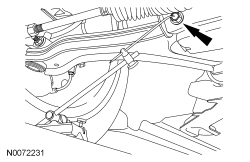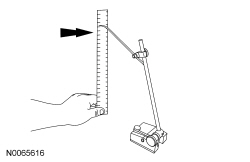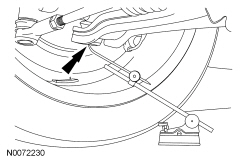SECTION 204-00: Suspension System — General Information
| 2014 Mustang Workshop Manual
|
GENERAL PROCEDURES
| Procedure revision date: 01/07/2013
|
Ride Height Measurement
Front Ride Height Measurement

| Item
| Description
|
|---|
| 1
| Ride height = 2 - 3
|
| 2
| Measurement 2
|
| 3
| Measurement 3
|
NOTE:
Make sure that the vehicle is positioned on a flat, level surface and the tires are inflated to the correct pressure. Vehicle should have a full tank of fuel.
- Position a suitable surface gauge (such as Starrett 57D Surface Gauge), on a flat, level surface and adjust the gauge's arm until the scriber point is located in the center of the lower control arm forward bolt.
- Lock the surface gauge in this position.
- With the surface gauge positioned on a flat, level surface, record the measurement of the surface gauge position (measurement 2).
- Position the surface gauge on the same flat, level surface as used in Step 1, adjust the gauge's arm until the scriber point is located in the center of the lower ball joint.
- Lock the surface gauge in this position.
- With the surface gauge positioned on a flat, level surface, record the measurement of the surface gauge position (measurement 3).
- Subtract measurement 3 from measurement 2 to obtain the front ride height.
- Refer to Specifications in this section.
Rear Ride Height Measurement

| Item
| Description
|
|---|
| 1
| Ride height
|
| 2
| Frame (measurement point 2)
|
| 3
| Top of axle tube (measurement point 3)
|
NOTE:
Make sure that the vehicle is positioned on a flat, level surface and the tires are inflated to the correct pressure. Vehicle should have a full tank of fuel.
- Measure the distance between the frame (Item 2) and the top of the axle tube (Item 3) to obtain the rear ride height (Item 1). For additional information, refer to Specifications in this section.






